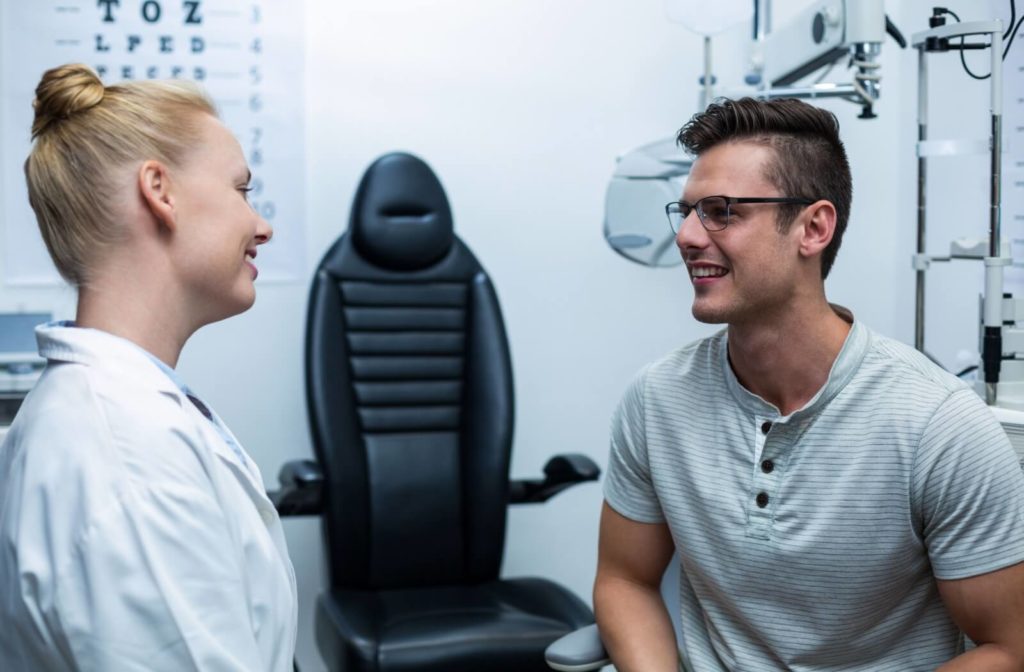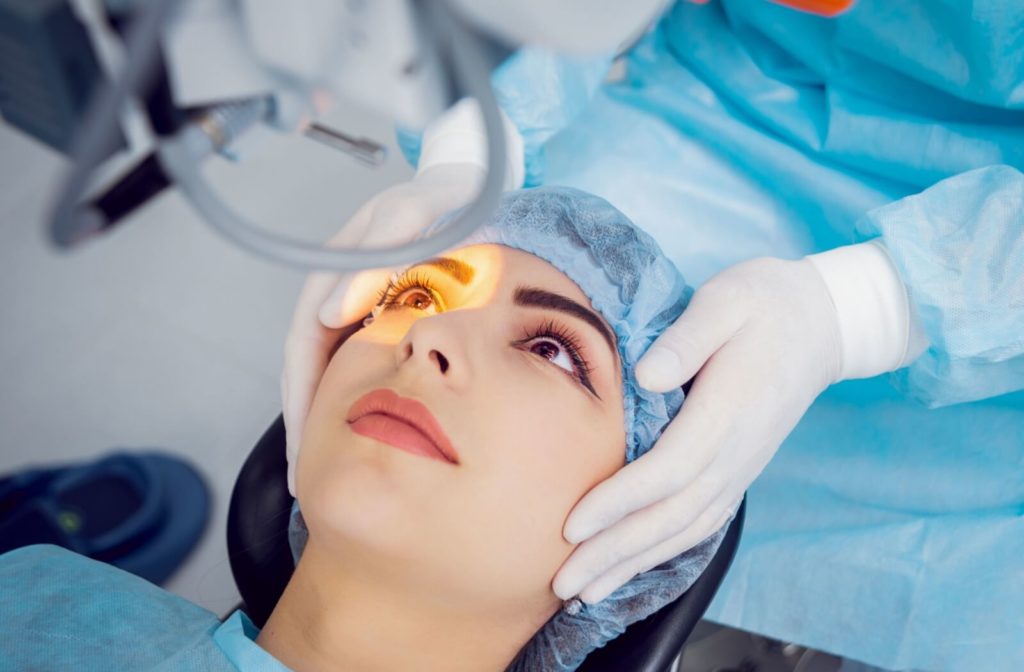Laser eye surgery is a procedure that can eliminate the need for corrective eyeglasses and contact lenses. While clear, natural vision appeals to many people, not everyone is a candidate for laser eye surgery.
Laser surgery is not for you if:
- You’re younger than 18 years old.
- You take medications that can change your vision.
- You have thin corneas.
- You had a prescription change in the last 12 months.
- You are pregnant or nursing.
- You have an autoimmune disease.
Speak to your eye doctor about corrective eye surgery and whether you’re a candidate based on your eye health and vision needs.
What Is Laser Eye Surgery?
Laser eye surgery is a popular refractive surgery procedure that can correct vision problems such as nearsightedness, farsightedness, and astigmatism.
Refractive errors result from an irregularly shaped cornea (clear front part of the eye). Laser eye surgery reshapes the cornea so that the light entering the eye is properly focused onto the retina (the light-sensitive tissue at the back of the eye) to provide clear vision without needing glasses or contact lenses.
Types of Laser Eye Surgery
LASIK and PRK are 2 common types of laser eye surgery.
LASIK
Laser-assisted in situ keratomileusis (LASIK) is a vision correction procedure that uses a laser to alter the shape of your cornea. LASIK involves creating a flap on the cornea’s surface and using a laser to reshape the tissue underneath. When the procedure is complete, the flap goes back in place and heals with no stitches.
PRK
Photorefractive keratectomy (PRK) is a laser eye procedure that removes the outer layer of the cornea without creating a flap. With the corneal tissue exposed, a laser can reshape it to correct your vision. A bandage contact lens is then placed over the cornea to help with healing.
Who Is Not a Candidate for Laser Eye Surgery
Laser eye surgery is not a one-size-fits-all solution to vision correction. For this reason, not everyone is a candidate for laser eye surgery, and there are essential criteria that potential candidates must meet. You should not have laser eye surgery if you don’t meet these requirements.
Age-Related Factors
Age-related vision changes are a natural part of life. Those under 18 often experience changes in their vision that make surgery an unwise option. For individuals over 40, the eyes typically lose the flexibility you need to focus clearly after close work, making reading glasses sometimes necessary, regardless of laser eye surgery.
Medication
Certain prescription medications can affect or delay healing after laser eye surgery. Some medications can also cause dry eye, which laser eye surgery can worsen.
Eye Health Concerns
Eye health is paramount before laser eye surgery. Those with underlying eye conditions such as severe dry eye, eyelid inflammation, or thin corneas aren’t suitable candidates for laser eye surgery.
Unstable Vision
If you have fluctuating vision or you’ve had a prescription change in the past 12 months, you’re not a candidate for laser eye surgery. Since laser eye surgery is a permanent procedure, you must have a stable prescription.
Pregnancy & Nursing
Hormonal changes during pregnancy can cause changes to your vision and prescription. Nursing women should wait until after weaning to allow their vision to stabilize before doing laser eye surgery.
Health Conditions
Certain health conditions could affect healing after laser eye surgery. Diabetes, immunodeficiency conditions, and some autoimmune diseases can affect the body’s ability to heal properly after surgery, which is critical for a safe and successful outcome.
Alternative Options to Laser Eye Surgery
For those of whom laser eye surgery is not an option, several alternatives can help improve your vision.
Glasses
Glasses are the most common and least invasive method of vision correction. They are available in various lenses and styles to suit any budget and lifestyle.
Contact Lenses
Contact lenses offer an effective alternate means of vision correction than glasses and laser eye surgery. With technology advancements, you can now find contact lenses for many eye issues and wear schedules. Like laser eye surgery, contact lenses aren’t right for everyone. A contact lens exam can help determine if you’re a candidate for contact lenses.

Consult with Your Eye Doctor
It’s crucial to consult your eye doctor before deciding on any vision correction method or to assess your suitability for laser eye surgery or contact lenses. They can discuss your vision correction goals and provide you with information about the risks and benefits associated with different types of laser eye procedures.
Options for Vision Correction
While laser eye surgery isn’t suitable for everyone, effective alternatives, like glasses and contact lenses, can help improve your vision quality. It’s important to engage with your eye doctor and weigh the options carefully. Book a consultation with Total Vision Sports Arena to learn more about laser eye surgery, its risks, and its benefits.



